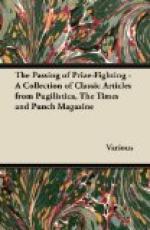Some people complain that politics are dull. They should read the parliamentary and extra-parliamentary utterances of the Member for Wrottenborough. They appear weekly in that rising young paper, the Sunday Times, and an extremely readable selection of them has lately been published “in book form,” for the enlivening of the Recess. Adapting the Laureate’s lines, the Baron would say,—
“They who would vote for an M.P.
whose sense with humour chimes,
Will read the Member for Wrottenborough,
all in the Sunday Times—
A paper our sires paid Sevenpence for,
along of its grit and go,
Seventy years
ago, my Public, seventy years ago!”
For whimsical audacity, and quaint unexpectedness. Mr. PAIN, in his latest book, Playthings and Parodies, would be hard to beat. In this there is a good back-ground of shrewd observation. He does not propose to make your flesh creep, or your eyes run torrents. He simply succeeds in making you laugh. In “The Processional Instinct,” Mr. PAIN informs us that he has discovered that our private life is circular, and our public life is rectilineal. SHAKSPEARE, who, being for all time, and not merely for an age, recommends this author to the general public when he says that everybody “should be so conversant with PAIN.”
The Memories of Dean Hole is rather a misleading title; “but,” says the Baron, “I suppose the term ‘Reminiscences’ is played out. The word ‘Memories’ seems to suggest that someone, whether Dean HOLE, or Dean CORNER, or any other Dean, had more than one memory, as indeed those persons appear to possess who mention their ‘good memory for names,’ and their ‘bad memory for dates,’ and vice versa. Soit!” quoth the Baron, in excellent French, “you may take it from me (if I’ll part with it) that the Hole book is by no means a half-and-half sort of book, but is vastly entertaining.” The stories of “The Cloth” form the most entertaining part of the work. The Baron wishes success to this work of the Dean in Holey Orders, and suggests that the volume should be re-entitled Gathered Leaves from Dean Hole’s Rose Garden, a better title than “Reminiscences.”
MARION CRAWFORD’S Don Orsino (published by MACMILLAN & CO.) would be worth reading were it only for the colour of its word-painting, and for its high-comedy dialogue. Yet is Mr. CRAWFORD rather given to pause in his story, for the sake of moralising on the tendencies of the age; and the reader, patient though he may be, when he has become interested in the personages of the novel, does not care to be button-holed by a digression. MARION CRAWFORD’S recipe for commencing an amorous duologue (early in Vol. III.), which is to lead up to a declaration of love, is deliciously ingenious. It begins with the gentleman taking a seat, and his first remark is upon the chair. Mr. CRAWFORD evidently remembers the old story of how the tenor who knew but one song,




